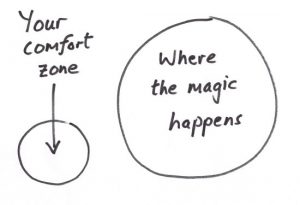
How to Restore Healthy Boundaries for Volunteer Coordinators
To preface any discussion about healthy boundaries, especially in volunteer management, it’s important to start by talking about the line that should never be gray, and never be crossed.
There are a few things to which your work and boss are not entitled. Your health, family, sanity, and identity are top of the list. You may have others that fall outside the boundaries for you. Whatever they are, mark them as sacred and do not waver.
As volunteer professionals, we do heart work in a people-centric industry. In these positions where we ask people to selflessly give their time, it can sometimes feel hypocritical to not also give of yourself… until it hurts.
Run away from that feeling. Fast! If you don’t honor your own boundaries, how will anyone else be expected to?
Are we good on that? Cool.
This is a constant struggle, especially for dedicated and passionate people, which, it turns out, is a group heavily populated by volunteer managers.
Even when you’ve got a relatively good balance of work and life, the life of a nonprofit professional, and especially those doing volunteer management, is almost certainly going to involve more hats than is ideal. The moment you decide to try and do more than humanly possible, you’ve taken a step toward sacrificing one of those sacred aspects of your life. You’ve crossed that sacred boundary.
Please. Don’t do it. Even when you live and breathe your mission, it’s still work. No job, even the noblest one, should ever precede your health or sense of self.
[inf_infusionsoft_inline optin_id=”optin_40″]
Work-Life Balance and Volunteer Management
Because of all the volunteer management hats, it’s only natural that the balance between your work time and personal time can cause tension. Most of the time, it’s not intentional. It just kind of happens and, before we know it, we’re working 80 hours a week and drinking 16 cups of coffee a day to get anything checked off the to-do list.
Regardless of how firmly you stand up for your own limits, sometimes you can’t control what gets dropped on your desk. In most cases, taking a few healthy steps with your boss (or whoever it is that adds things to your priority list) can also help maintain healthy boundaries.
Assuming your boss does not want or expect you to sacrifice yourself to oblivion, there are some steps you can take to help ease the effects of getting asked to do more than you can really do. (And if you are expected to sacrifice your health, sanity or self, take this as your official red flag!)
None of this is rocket science, but it can be challenging and even a little scary. So here are a few suggestions about ways to make sure your boss understands the weight of your to-do list.
Communicate with your boss.
Your boss is a nonprofit professional, not a mind reader. More than likely, they do not know what you do every moment of the day, just as you do not know what they do all day. Frankly, it would be a waste of everyone’s time and a lack of trust if they checked up on every task you were doing. So, take it as a compliment and do your part to communicate when you’re overstretched or feeling out of balance.
When you start the conversation about your limits, make it clear you aren’t trying to avoid doing your job. Reiterate that you understand your volunteer management role, responsibility, and accountability. Emphasize that you want to do good work, which is at the center of why you need to draw healthy boundaries. You’re no good to anyone when it takes an unholy amount of caffeine to keep you upright.
Respect Goes a Long Way
Be respectful, professional, and honest. You’re not a victim and you’re not there to whine. Empathize with the organization’s constraints and ask that personal constraints become a greater part of the dialogue around organizational priorities. Stay professional but be honest about what a healthy number of hours and stress level looks like.
As an example, I once received an out-of-the-blue all-staff group text, saying the sender was going to start shutting off their organization-paid phone after a certain time. No prior discussion. No acknowledgment of how that sudden decision might impact other team members. Healthy boundaries were one of the organization’s priorities, but the delivery was neither respectful or professional and consequently created resentment on the team.
Handled professionally, a discussion about boundaries won’t have negative consequences and may even win you new respect from your boss.
Be concrete. It’s not about being busy.
Approach a conversation about healthy limits with solutions and data. It’s not about being busy. Everyone is busy. Instead of “I’m so busy!” try “If I spend time on Priority X, there will not be enough time to do Priority Z.” Come with possible solutions and ask for your boss’ help in creating a plan that will keep your boundaries healthy and keep the organization on track.
Are there tasks that can go in the “parking lot” for a while? Are there staff or volunteers who can add support? Maybe there are some efficiencies that your boss can help you put in place. Come with some options and then work to co-create a plan.
Everyone is Busy
The other thing with “I’m so busy!” is that nearly everyone feels “so busy,” including your boss. If you lead with solutions it shows an understanding of the organization’s needs and that they can (and should) work in concert with your boss’ needs and yours.
You can even take it a step further and set up a time tracking system. It can be as simple as a notepad you keep by your computer, an Excel spreadsheet, or any number of apps for your phone. (My personal favorite is Timeular.) This can have two effects.
1. You just might find your own efficiencies. Time tracking is easier when you’re monotasking, or at least not multitasking yourself 5 ways each minute. Chunking out your time and tracking it is an exercise that, in and of itself, has efficiency built in. Even if you track without monotasking, you’re likely to find surprises in how you spend your days.
2. You also can use this data to support your boundaries discussion with your boss. Look at the data for a week and compare it with the number of hours that you have available to work in a month or quarter. If you are full-time and have 160 hours/month to work and the projects on your plate would reasonably require 400 hours/month, you’ve identified a huge part of your work/life balance issue.
Use this to drive home the point that something on your plate needs to temporarily or permanently move to someone else’s responsibility.
Follow through.
As difficult as these conversations might be, the hardest part of holding limits may be your own follow through. Again, in volunteer management, we are often compelled to do more, but in order to get the healthy boundaries that you need to keep your health, family, or sanity sacred, you’re going to need to follow your own rules.
Follow the priories that you and your boss decided upon. If they said something can wait, don’t go working on it now. It can wait and unless you’ve suddenly fallen into some free time (ha!), keep it in the parking lot.
Set your feet. Unless you are on-call or there is some other compelling reason, turn work off when you’re off.
I recently had a conversation with one of our VolunteerPro members about the freedom she experienced when she and her boss had a conversation about turning her phone off on the weekends. “Nobody died, nobody really even noticed,” she said.
The key was that once they had the conversation, it was up to her to actually turn the thing off and keep it off. It’s hard at first but if you start answering those emails, you let everyone know that you’re available and the expectation will switch back to constant work communication.
You can, and should, have healthy boundaries.
When everyone around you is overworked and you live in a culture that is obsessed with being busy, it might feel odd to have work-life balance. Let it feel odd.
 Volunteer management is hard work, no matter how you slice it. It important work that cannot be done without tons of energy and passion. If the work destroys that energy and passion, it’s a losing proposition for you, your organization, and the very volunteers who depend on it.
Volunteer management is hard work, no matter how you slice it. It important work that cannot be done without tons of energy and passion. If the work destroys that energy and passion, it’s a losing proposition for you, your organization, and the very volunteers who depend on it.
If you need more guidance on efficiency as a volunteer professional, check out our free webinar on time management.
[inf_infusionsoft_inline optin_id=”optin_40″]






